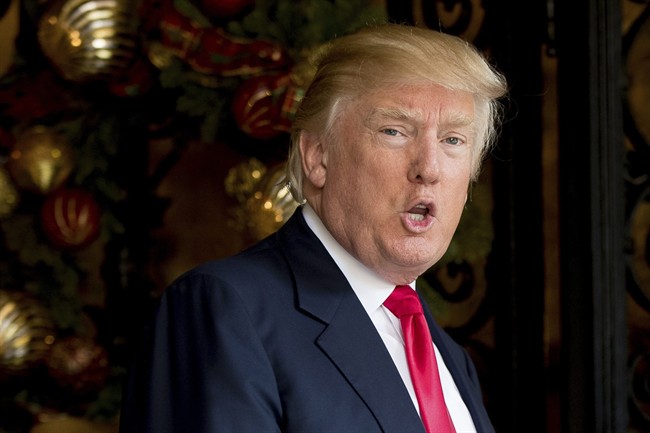Canada’s banks are already seeing the benefits of pro-growth policies pursued by President Trump’s new U.S. administration, executives said, with expectations of tax cuts, lighter regulation and fiscal stimulus boosting market confidence.

Shares in Canadian banks, which have substantial operations in the United States, have soared since Trump’s election victory on Nov. 8., boosted by hopes of higher U.S. interest rates on Trump policies like a $1 trillion infrastructure spending plan.
READ MORE: Protecting Canada from a U.S. border tax could lie in NAFTA negotiations: Trump adviser
Toronto-Dominion Bank, Canada’s second biggest lender which also has a major U.S. presence, on Thursday reported better-than-expected earnings in the first quarter to Jan. 31 helped by a strong U.S. performance.
TD’s Chief Financial Officer Riaz Ahmed said in an interview that activity in equity and bond markets had “picked up considerably” since the U.S. election while business confidence in the United States was also improving.
“There is momentum right now and companies are taking advantage, to look at acquisitions and do financings. It feels like business confidence is strong,” said Ahmed, adding that expectations around interest rates, regulations and taxes “all bode well for the (banking) industry.”
READ MORE: Donald Trump promises ‘massive’ tax cuts for middle-class, companies
TD and Bank of Montreal have the biggest exposure to the United States among Canadian banks, with about a quarter of their profits coming from that market.
Shares in TD, which has around 1,300 branches in the United States, are up 15 percent since November with BMO shares up 23 percent.
BMO reported forecast-busting results on Tuesday beating market expectations by the widest margin achieved by any Canadian bank this quarter, helped by a strong performance by its retail banking, wealth management and capital markets business in the United States.
“We see good growth opportunities across those businesses in the U.S.,” Chief Financial Officer Tom Flynn said in an interview.
WATCH: Bank of Canada outlines how Trump election effects Canada’s economy

U.S. gets expensive
Analysts said that, although Canadian banks’ domestic businesses performed reasonably well during the quarter, their U.S. growth was likely to outperform domestic growth in the near-to-medium term.
“The expectation for earnings growth in the U.S. is stronger than it is in Canada, based on economic activity and rising interest rate forecasts,” said Barclays analyst John Aiken, adding that investors were showing a preference for banks with greater exposure outside of Canada.
Still, the rising valuations of U.S. banking stocks since the election presents a challenge to banks looking to enter the U.S. market or expand their existing operations through acquisition.
READ MORE: Despite higher inflation, Bank of Canada leaves rates untouched
Canada’s fifth biggest lender CIBC faces a struggle to complete its planned $2.9 billion takeover of Chicago-based PrivateBancorp Inc and end what some analysts see as an over-reliance on its home market.
PrivateBancorp canceled a shareholder vote on the deal in December after some investors indicated they would reject the proposal.
Many PrivateBancorp investors had expected CIBC would come back with a higher offer when it reported results on Thursday but, for now at least, the Canadian bank is holding off on improving its offer, leaving the deal in limbo. The two banks have until June to reach a deal.
Edward Jones analyst Jim Shanahan expected the deal to eventually go through but was concerned CIBC could end up overpaying.
“I think they’ll plow ahead stubbornly and get this deal done because there aren’t many other opportunities out there,” he said.
Royal Bank of Canada, which acquired Los Angeles-based City National for $5.4 billion in 2015, is also looking to expand in other U.S. cities but Chief Executive Dave McKay said valuations were prohibitive.
“You look at the prices of U.S. banks and the ability to generate synergies and return on capital remains challenging at best,” he said.
- As Canada’s tax deadline nears, what happens if you don’t file your return?
- Posters promoting ‘Steal From Loblaws Day’ are circulating. How did we get here?
- Planning a summer trip to Quebec’s Îles-de-la-Madeleine? You’ll have to pay up
- Drumheller hoping to break record for ‘largest gathering of people dressed as dinosaurs’



Comments